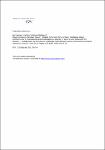Infections due to Pseudallescheria/Scedosporium species in patients with advanced HIV disease — a diagnostic and therapeutic challenge
Tammer, Ina
Tintelnot, Kathrin
Braun-Dullaeus, Rüdiger C.
Mawrin, Christian
Scherlach, Cordula
Schlüter, Dirk
König, Wolfgang
Objectives: The aim of this study is to highlight the importance of infections caused by members of the genera Pseudallescheria/Scedosporium in HIV-positive patients. Methods: We describe a case of a fatal scedosporiosis in a treatment-naïve HIV patient and review all previously reported cases of pseudallescheriosis/scedosporiosis from a search of the PubMed and Deutsches Institut für Medizinische Dokumentation und Information (DIMDI) databases, applying the terms ‘Pseudallescheria’, ‘Scedosporium’, ‘Allescheria’, ‘Monosporium’, ‘Petriellidium’, ‘boydii’, ‘prolificans’, ‘inflatum’, cross-referenced with ‘HIV’ and ‘AIDS’. Results: Detection of Scedosporium and Pseudallescheria species has been reported in 22 HIV-positive patients. Fourteen isolates belonged to the Pseudallescheria boydii complex and eight to Scedosporium prolificans. Invasive scedosporiosis (IS) was proven in 54.5% of the patients. Among them dissemination was observed in 66.7%. Pseudallescheria/Scedosporium species were mainly isolated from male individuals. Patients with proven IS showed CD4+ cell counts
No license information

